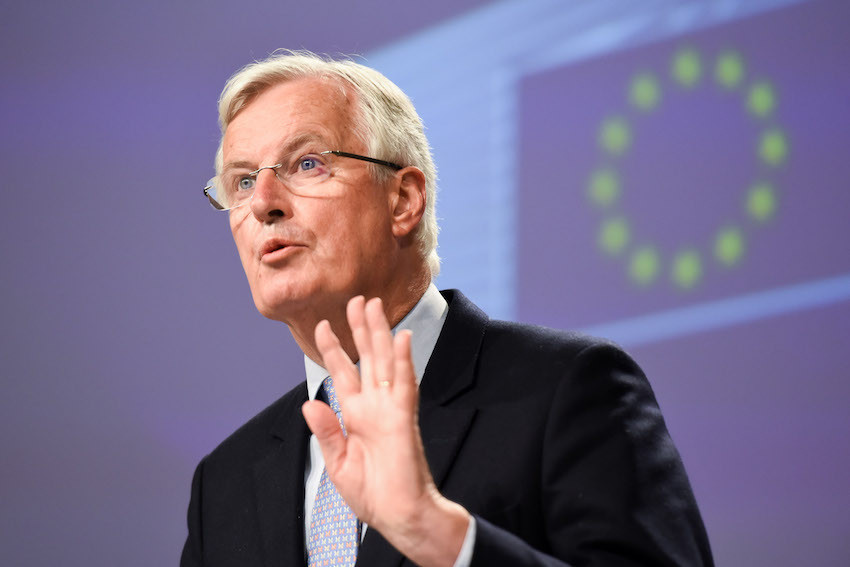Brussels and London cut talks short
Post-Brexit negotiations between the EU and UK ended a day early. Michel Barnier, the EU’s chief negotiator, said “serious divergences remain” but signalled some flexibility. Barnier said that Brussels had “listened carefully to UK prime minister Boris Johnson’s” red lines on the jurisdiction of the European Court of Justice and observance of EU law, as well as on fishing rights. However, Barnier suggested that the UK government had been unwilling to compromise. Sources: Bloomberg, Euractiv, Financial Times, The Guardian and the Telegraph.
Germans can continue to telecommute due to covid-19
Germany and Luxembourg extended their temporary deal allowing unlimited teleworking until the end of July, Bloomberg and the German MP Andreas Steier reported. France and Belgium previously extended their similar deals until the end of August, but Paris has said the waivers will not become permanent.
Luxembourg housing not affordable for many: report
The cost of housing is rising faster than incomes for the 40% of the population on lower incomes, according to a government report. Nearly half of low-income households spend more than 40% of their monthly budget on rent; the figure is above 25% for those on modest incomes. The report called for building more public housing. Source: Housing ministry.
EU top court rules against Blackrock in tax dispute
The European Court of Justice rejected the argument by Blackrock, the world’s largest asset manager, that its UK unit should not have to pay VAT on services provided by a software vendor (owned by its US-based parent company). Blackrock said it had continued to pay VAT during the dispute. Sources: CityAM, Courthouse News Service and Reuters.
Maduro loses BOE gold case
A British judge rejected the claim filed by Nicolás Maduro, Venezuela’s president, for $1bn in Venezuelan gold reserves stored at the Bank of England. The court ruled that Juan Guaidó, not Maduro, is the country’s legitimate leader. Sources: BBC, Bloomberg, CNN and Financial Times.
Hundreds arrested after police hack crime chat network
Police across Europe arrested more than 800 suspects after investigators cracked into Encrochat, an encrypted communications system which was allegedly used to trade in illicit drugs and guns. Sources: AFP, Associated Press, BBC and Politico.
Maxwell accused of being Epstein accomplice
The British socialite Ghislaine Maxwell was arrested and charged with recruiting underage victims for the convicted sex abuser Jeffrey Epstein. Maxwell did not enter a plea, but has previously denied any wrongdoing and in an earlier deposition called one of her accusers a liar. Sources: CNN, Deutsche Welle, The Guardian and New York Times.
Finnish military discreetly stops using swastika
Finland’s air force has dropped the swastika from its emblem, which it adopted in 1918 before the symbol was used by the Nazis. The switch started in 2017 but was never publically announced. Sources: Associated Press, BBC, Deutsche Welle and Helsinki Times.
Luxembourg virus update
50 people tested positive in Luxembourg during the 24 hours to Thursday afternoon (out of more than 3,600 people tested), per the health ministry. The number of new cases had been under 100 per week from late April to mid-June, when the rate began to increase.
Agenda
Friday 3 July, 11am-12noon: Amchams in Europe hosts its second “Covid-19 crisis and economic recovery” webinar. Saturday 4-Sunday 5 July: Celebrate American Independence Day on July 4th and July 5th at Kyosk in Kirchberg. Monday 6 July, 4pm: Linklaters webinar on US economic sanctions. Monday 6 July, 7pm-9pm: Green Heart Toastmasters public speaking club holds its first post-confinement physical meeting in Kirchberg. Tuesday 7 July, 6pm-7:15pm: Paperjam Club roundtable on managing the careers of professional football players.
Here are 10 science & technology stories you may have missed
Aeronautical engineering: The F-35 Lightning II jet fighter was banned from flying near meteorological lightning due to a design flaw that could, as Popular Mechanics put it, “place the aircraft in danger of exploding if the airplane were hit by lightning in mid-flight.” Biology: Studies have shown that left-handedness is not unusual at birth; only 64% of babies are inherently right-handed, a figure which rises to roughly 90% as children age, per Popular Science. Computer programming: Mathematics is facing a new set of “dynamic resource allocation problems”, where “One change triggers another change, and if you want to control the system with accurate decisions, one must consider the future status of the system,” explained the BBC. Digital security: Akamai, an internet infrastructure firm, said it fought off the biggest distributed denial of service attack (where attackers try to overwhelm a website with a mass amount of fake traffic) that it has ever observed, against an unnamed European bank, per The Register. Emerging tech: A librarian in the US state of Virginia has been using a drone to deliver books to children staying home during the covid-19 outbreak, per CBS News. Internet: Many Hong Kong residents have begun changing or deleting social media posts and profiles in light of Beijing’s new national security law, per Nikkei Asian Review. Fauna: Snapping shrimp (Alpheus heterochaelis) refresh their view 160 times a second (compared to 60 for humans) given them the fastest known eyes in nature, per Science magazine. Medicine: Researchers are investigating if giving live polio vaccine could provide temporary (about 1 month) protection against the coronavirus that causes covid-19, per Popular Mechanics. Space exploration: Nasa is developing a rover that search for signs of life on Mars and use AI to sift through the readings before sending back the most promising data to Earth, per The Register. Robotics: Researchers at the University of Zurich developed an algorithm that allowed autonomous drones to create their own aerial student manoeuvres, per New Atlas.
Note to our readers
The breakfast briefing is taking a summer break. For the latest news and analysis, sign up for Delano’s noon briefing and follow Delano on Facebook, Linkedin and Twitter. The breakfast briefing will be back in your inbox on 7 September.
Today’s breakfast briefing was written by Aaron Grunwald
